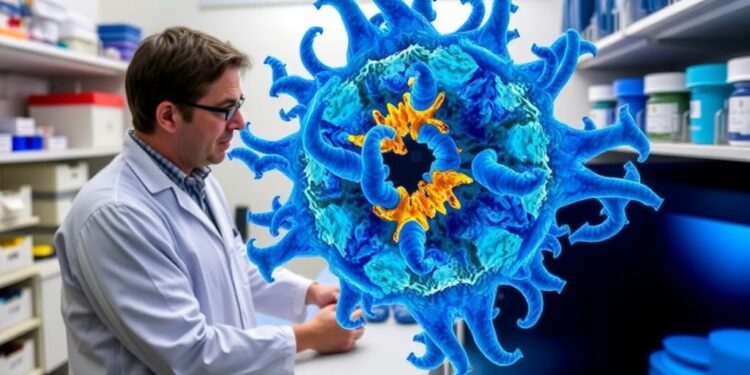For the first time, scientists have made a groundbreaking advance in cancer research by developing drug candidates that bind irreversibly to a cancer protein target known for its “undruggable” nature. This breakthrough is positioned as a potential game-changer in how we approach cancer therapies, particularly those that target transcription factors—proteins that regulate gene activity and are pivotal in the progression of cancer. Historically, these transcription factors have posed significant challenges to researchers attempting to design effective treatments, primarily due to their complex structures and functions.
Transcription factors are integral to the process of gene expression, acting as critical regulators that manage the on and off states of genes. Their role in cancer development is profound, as mutations and overexpression can lead to unchecked cell growth, a hallmark of malignant transformation. Until recently, attempts to create small molecule drugs that effectively inhibit these proteins have met with limited success. Peptide-based therapies have emerged as an alternative strategy, leveraging small protein fragments to bind and block the activity of these challenging targets.
Researchers at the University of Bath have unveiled a technique employing a novel drug discovery platform known as the Transcription Block Survival (TBS) assay. This assay allows scientists to test a vast library of peptide fragments, seeking those that can effectively “switch off” transcription factors driving cancer progression. By screening a myriad of peptides, the researchers were able to identify compounds designed to interact specifically and irreversibly with the transcription factor cJun, which has been linked to aggressive cancer phenotypes.
The innovative approach not only focuses on identifying reversible inhibitors but pushes the boundaries by successfully engineering peptides that can bind irreversibly to cJun. The technical design of these peptides allows them to latch onto one of the two identical halves of cJun, effectively preventing these halves from pairing and subsequently attaching to DNA. This dual-lock mechanism not only diminishes cJun’s ability to transactivate its target genes but also solidifies the peptide’s grip on the transcription factor, creating a robust and lasting blockade.
Dr. Andy Brennan, a key figure in this study and Research Fellow in the Department of Life Sciences at the University of Bath, likens the mechanism of the peptide to a harpoon that is launched toward its target with the intent to remain attached. This high-affinity binding strategy is critical in ensuring that cJun cannot resume its active role in the cell, which is crucial for furthering cancer cell proliferation. This represents not just a theoretical advancement but a practical methodology that has been tested successfully within a cellular context.
The TBS assay works by introducing binding sites for cJun within essential genes in cultured cells. When cJun binds, it effectively silences these genes, leading to cellular demise. Conversely, the application of the newly developed peptide inhibitor allows the gene activity to be reinstated, resulting in the survival of the cells. This direct measurement in a relevant biological environment marks a significant improvement over traditional drug screening methodologies that often fail to account for complex intracellular interactions.
The implications of this research extend far beyond cJun and underscore the potential for this peptide-based approach to be applied to other previously deemed “undruggable” targets. Many conventional pharmaceuticals have struggled with issues of cell permeability and toxicity; however, this direct cellular approach mitigates some of these obstacles, opening avenues for the discovery of new drug candidates. Jody Mason, Chief Scientific Officer at Revolver Therapeutics, emphasizes that testing in vivo responses to peptides could spur the identification of additional promising therapeutics that address a broader spectrum of oncogenic drivers.
This study lays the groundwork not only for potential treatment avenues for cancers driven by cJun but also signals a paradigm shift in drug discovery for difficult protein targets. With the rigorous validation of the peptides’ activity in cancer cells, researchers are now poised to advance to preclinical cancer models, where they will test the efficacy and safety of these innovative inhibitors in live biological systems. This next step is crucial for understanding how these peptides behave in more complex living organisms.
As the field of cancer research continues to evolve, this work represents a crystallization of innovative thinking and collaborative effort that could yield significant benefits for clinical oncology. The scientists at the University of Bath are not just addressing existing challenges; they are pioneering new frameworks for future drug discovery that could have sweeping implications across various fields of medicine, particularly in the fight against cancer. The promise of irreversible transcription factor inhibitors transcends the experimental realm, anticipating translations to tangible treatments that could alter the prognosis of patients battling various forms of cancer.
This momentous achievement not only highlights the capabilities of peptide engineering but is also a testament to the relentless human pursuit of knowledge in the face of daunting biological complexities. The identification of these irreversible covalent transcription factor inhibitors serves as both a beacon of hope for patients and a clear signal to the scientific community of the potential that lies within reimagining drug development strategies. With further exploration and validation, these findings could very well inspire a new generation of therapeutics capable of tackling the formidable challenges posed by cancer.
Subject of Research: Cells
Article Title: An Intracellular Peptide Library Screening Platform Identifies Irreversible Covalent Transcription Factor Inhibitors
News Publication Date: 17-Mar-2025
Web References: Advanced Science
References: 10.1002/advs.202416963
Image Credits: (Not provided)
Keywords: Cancer research, Drug research, Discovery research, Peptides, Transcription factors, Molecular targets, Drug candidates, DNA binding proteins.
Tags: advancements in oncology researchbreakthrough in cancer therapeuticscancer drug discoverydrug candidates for cancer therapygene expression regulationirreversible binding cancer drugsnovel cancer treatment strategiespeptide-based cancer therapiessmall molecule inhibitors for cancertranscription factors in cancerundruggable cancer targetsUniversity of Bath cancer research





